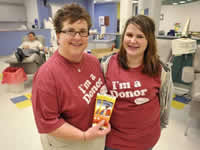 |
![]()
Payback yields Super Bowl surprise for blood donor
by Dorothy Schneider, Lafayette Journal & Courier
She's been trying to pay back a debt -- slowly replacing the units of blood that were made available to her husband, Chuck, during two lengthy hospital visits before he died in 2003. Sikler recently surpassed the "break even" point, having racked up 143 units of either whole blood or platelet donation. "It's a way for me to do something for someone that can't ever thank me or pay me back personally. It's giving without expectation," she said. And it's helped the 50-year-old from Lafayette deal with the grief of losing her husband. Her frequent blood donations qualified her for the Indiana Blood Center contest offering one pair of tickets to Super Bowl XLVI to a donor who gave blood or blood products four or more times in a three-month period. But Sikler was as surprised as anyone when she found out recently that she'd be attending football's biggest event next Sunday in Indianapolis. "I'm not the kind of person who wins things," she said. Yet those around Sikler say no one is more deserving of such a prize. "She's a good example of what people should do," said Dee Duncan, a phlebotomist at the Lafayette Indiana Blood Center facility. Even though Sikler had donated blood sporadically throughout her life, she became a regular at Indiana Blood Center after losing her husband. Chuck Sikler, a former pastor at Baptist Temple in Logansport, was diagnosed with a colon disease and had surgery in August 2000 to remove the organ. He ran into various complications during the post-surgery hospital stay, including five staph infections, "any one of which should have killed him." But through intensive care and ongoing treatments, the Sikler family had two and a half more years together. Finally, in 2003, Carol and Chuck Sikler ran out of hope for a permanent fix. "He saw nothing that offered him any relief and said to me, 'There's no point in me fighting this when I can go and be with Christ.' "Within hours of being taken off the machines, he was gone." About a year after his death, Carol and her daughter moved to Lafayette to be closer to Sikler's job at Purdue University, where she's worked in the Agricultural and Biological Engineering Department for 14 years. Even before moving here, though, Sikler started her "pay back" to Indiana Blood Center. On one of her early visits she was asked to be a platelet donor. The platelet donation process takes longer, as much as two hours each time, because the blood is taken out and platelets are separated through a machine. The red blood cells and most of the plasma, or liquid in the blood, are then returned. This replenishment to the donor means people can give platelets more often, some every seven days. Sikler's been religious as a donor, even when it's required her to use vacation time to leave work early and make appointments. Now her daughter is hoping to join the cause. Cammie Sikler donated blood for the first time last month. Even though she's only 16, she was allowed to donate with the consent of her mother. Having gone with her mother many times to Indiana Blood Center over the years, Cammie knew what to expect yet still was nervous. "But it went fine," she said. Cammie said she was a true "daddy's girl" growing up and has many happy memories from the eight years she had with her father. Her mother is her biggest role model now. "She's always there for me. If I need anything, I go to her," she said. Duncan, who's worked closely with Sikler at the Lafayette donation center, called her one of the most dynamic women she's ever met. "When she walks into a room, she's boisterous and vivacious. There's a little bit of country in her, which is charming," Duncan said. "She's very dedicated to her church, to her daughter. And she's very dedicated to donating blood." Wendy Mehringer, chief marketing officer for Indiana Blood Center, said contests, such as the Super Bowl ticket giveaway, are meant to encourage more donors to follow Sikler's example. The organization is trying to increase donation volume by pushing people to give at least twice each year. "You can donate every 56 days, but that's not the case for most people," Mehringer said. "We don't see most people twice." More frequent visits from the blood center's 110,000 unique donors would go a long way toward stabilizing the state's supply. And Mehringer said platelet donations are always needed because the product has only a five-day shelf life. Mehringer said Sikler's trip to the Super Bowl is well-deserved. and as a fan of the Indianapolis Colts, Sikler plans to root for Eli Manning and the New York Giants -- and "against everything (New England) Patriots." "We have only one person going to the game, but (Sikler's) carrying the flag for all of us at the blood center," Mehringer said. "We could not be more excited for her."
|
 For most of the past decade Carol Sikler has spent hours each month strapped to machines at the local Indiana Blood Center.
For most of the past decade Carol Sikler has spent hours each month strapped to machines at the local Indiana Blood Center.